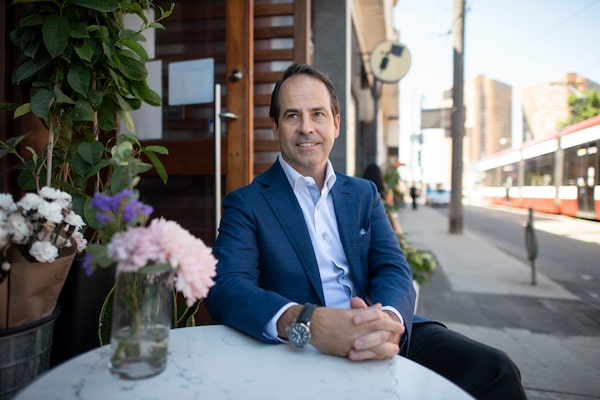Bank of Montreal BMO-T chief executive officer Darryl White says that even when interest rates begin to cool, banks and consumers will face a suite of new challenges in a rapidly changing market.
At the lender’s annual shareholder meeting Tuesday, Mr. White pointed to shifting dynamics from the climate and energy transition and from evolving technology demands.

Darryl White, Bank of Montreal CEO.Fred Lum/The Globe and Mail
“While inflation fell from four-decade highs across North America, it remains sticky, keeping borrowing costs high and global demand low – risking a higher-for-longer rate environment,” Mr. White told shareholders. “And even when rates do start to ease – and they should in time – we will find ourselves in a new normal, an environment with fundamentally different characteristics than that of the past two decades.”
Statistics Canada said Tuesday that the country’s inflation rate edged higher in March, but core inflation – the Bank of Canada’s preferred gauge which omits more volatile components of the Consumer Price Index – was below 1.5 per cent
Last week, Bank of Canada Governor Tiff Macklem said recent inflation trends are promising, but he will need to watch the pace of inflation for longer before cutting interest rates. He cautioned that inflation could rise again if the central bank cuts rates too soon.
Higher interest rates have dampened demand for loans as indebted Canadian households grapple with the rising cost of borrowing. Meanwhile, competition for customer deposits in the U.S. has escalated as banks search for less expensive sources of funding.
Mr. White said that despite these pressures, the lender’s U.S. segment has posted pretax income, before loan-loss provisions, of more than US$1-billion each quarter since closing its acquisition of California-based Bank of the West last year.
With more companies seeking ways to transition to clean energy, Mr. White said that Canada and the U.S. will both benefit as the “world continues to turn to reliable and trusted suppliers of sought-after resources, technology expertise, and all forms of energy.”
Shareholders voted Tuesday against proposals asking the bank to combat tax havens, hold an annual advisory vote on its environmental objectives, publicize its CEO compensation-to-median-employee-pay ratio and disclose the effects of divestment from the Canadian oil and gas sector.
BMO recommended that shareholders reject the proposal urging the bank to continue holding its annual meetings in person rather than relying on a virtual format adopted during the COVID-19 pandemic. However, the motion passed with more than 50 per cent of shareholders voting in favour.
“We value the feedback we receive from shareholders proposals, and we will of course take this feedback into consideration,” BMO board chair George Cope said.
A similar proposal was tabled in recent weeks at annual meetings for Canadian Imperial Bank of Commerce and Royal Bank of Canada.
At CIBC, the proposal passed even after the bank recommended that shareholders reject it. The proposal failed at RBC, but still received significant shareholder support, with 47 per cent voting in favour of holding in-person annual meetings.